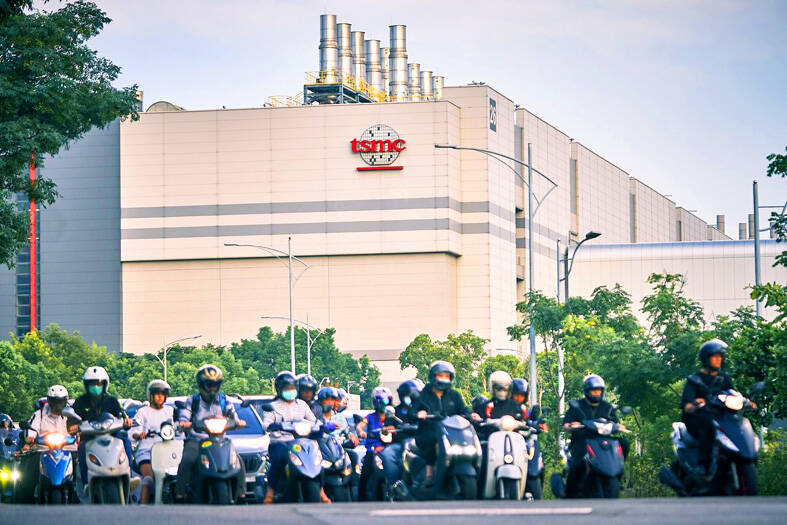Taiwan Semiconductor Manufacturing Co (TSMC, 台積電) on Saturday said that it has received a total of NT$62.5 billion (US$1.95 billion) in subsidies from China and Japan since 2022.
In the first half of this year, TSMC received NT$7.96 billion in subsidies from China and Japan after receiving about NT$47.55 billion last year and obtaining NT$7.05 billion in 2022, financial data compiled by the world’s largest contract chipmaker showed.
The company, which makes about 90 percent of the world’s high-end semiconductors, said the subsidies were used to finance its investments in Kumamoto, Japan, and Nanjing, China.

Photo: An Rong Xu, Bloomberg
TSMC owns a 12-inch wafer fab in Nanjing and officially opened a 12-inch fab on Feb. 24 in Kumamoto.
The chipmaker said it plans to build another advanced facility in Kumamoto, with operations scheduled to begin in 2027.
TSMC has also extended its reach to Germany and the US.
On Tuesday, the company broke ground on a 12-inch wafer fab in Dresden, Germany. European Commission President Ursula von der Leyen said the commission contributed 5 billion euros (US$5.6 billion) in state aid toward the project.
In the US, TSMC is building two advanced fabs in Arizona and plans to build a third fab there, with total investments expected to be more than US$65 billion.
TSMC has not received any subsidies from the US government yet, even though the US Department of Commerce announced in April that it had signed a non-binding preliminary memorandum of terms with TSMC for up to US$6.6 billion in direct funding.
As overseas investments would increase the chipmaker’s operating costs, TSMC said it would adopt flexible pricing strategies based on higher costs abroad to achieve a long-term goal of no less than a gross margin of 53 percent.

CHIP RACE: Three years of overbroad export controls drove foreign competitors to pursue their own AI chips, and ‘cost US taxpayers billions of dollars,’ Nvidia said China has figured out the US strategy for allowing it to buy Nvidia Corp’s H200s and is rejecting the artificial intelligence (AI) chip in favor of domestically developed semiconductors, White House AI adviser David Sacks said, citing news reports. US President Donald Trump on Monday said that he would allow shipments of Nvidia’s H200 chips to China, part of an administration effort backed by Sacks to challenge Chinese tech champions such as Huawei Technologies Co (華為) by bringing US competition to their home market. On Friday, Sacks signaled that he was uncertain about whether that approach would work. “They’re rejecting our chips,” Sacks

NATIONAL SECURITY: Intel’s testing of ACM tools despite US government control ‘highlights egregious gaps in US technology protection policies,’ a former official said Chipmaker Intel Corp has tested chipmaking tools this year from a toolmaker with deep roots in China and two overseas units that were targeted by US sanctions, according to two sources with direct knowledge of the matter. Intel, which fended off calls for its CEO’s resignation from US President Donald Trump in August over his alleged ties to China, got the tools from ACM Research Inc, a Fremont, California-based producer of chipmaking equipment. Two of ACM’s units, based in Shanghai and South Korea, were among a number of firms barred last year from receiving US technology over claims they have

It is challenging to build infrastructure in much of Europe. Constrained budgets and polarized politics tend to undermine long-term projects, forcing officials to react to emergencies rather than plan for the future. Not in Austria. Today, the country is to officially open its Koralmbahn tunnel, the 5.9 billion euro (US$6.9 billion) centerpiece of a groundbreaking new railway that will eventually run from Poland’s Baltic coast to the Adriatic Sea, transforming travel within Austria and positioning the Alpine nation at the forefront of logistics in Europe. “It is Austria’s biggest socio-economic experiment in over a century,” said Eric Kirschner, an economist at Graz-based Joanneum

France is developing domestic production of electric vehicle (EV) batteries with an eye on industrial independence, but Asian experts are proving key in launching operations. In the Verkor factory outside the northern city of Dunkirk, which was inaugurated on Thursday, foreign specialists, notably from South Korea and Malaysia, are training the local staff. Verkor is the third battery gigafactory to open in northern France in a region that has become known as “Battery Valley.” At the Automotive Energy Supply Corp (AESC) factory near the city of Douai, where production has been under way for several months, Chinese engineers and technicians supervise French recruits. “They